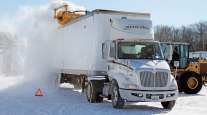Snow Thanks, Say Truckers: Wintry Weather a Headache for Country's Pro Drivers

Snow days are no fun for truckers.
Talk of ice and snow doesn't conjure up images of warm, cheery fires, snowball fights and paid days off work for them. Wintry weather makes them think of wrecks, traffic jams, middle-of-nowhere truck stops and unpaid time off.
Kimberly Welch drives a day cab making local deliveries for a small Knoxville-based trucking company, and she said Jan. 20 that taking an unpaid day off was a better option to her than fighting traffic in the ice and snow.
"You never get used to it," she said. "You talk about making a person a nervous wreck. It's not so much that I'm afraid to drive in it, it's what everyone else does."
BLIZZARD WATCH: In effect from Virginia to Long Island
SAFETY TIPS: If you absolutely have to be on the road
At least 70 crashes were reported in the Chattanooga area Jan. 20, thanks to the little bit of ice and snow that struck in the morning.
And Welch didn't miss any of it, giving herself a voluntary day off and looking back on years of over-the-road driving and hitting ugly weather out on the interstate, and limping into crowded truck stops and walking hundreds of feet in snow and sludge, and spending nights away from home.
"It'll scare you to death, driving in weather like this," she said.
Commercial drivers such as Welch keep close eyes on the weather this time of year. They know preparation and planning are vital.
"I get up in the middle of the night to see if I'm going to go or not," Welch said.
Christine Fewell delivers parts for automobile manufacturing — called timed freight, since car builders rely on a constant stream of incoming supplies to avoid warehousing materials on-site — and took her rig out the morning of Jan. 20 only to immediately turn around and go back to her terminal.
Road and traffic conditions were too bad for her to risk winding up stranded on the side of the road the night of Jan. 20.
"I don't feel like staying out in the truck anymore," Fewell said. "I've done it enough."
Like Welch, she volunteered to take an upaid day off.
And when conditions clear up, Fewell knows the freight still will be there, and it still will need to be delivered.
"They'll get it up here, one way or another," she said.
Fewell said on days like Jan. 20, as drivers opt out of going out on the roads, things can get a little crazy as fleet and terminal employees sort things out.
"They're running around like chickens with their heads cut off, but they're doing the best that they can do, you know," she said.
At trucking giants such as Covenant Transport in Chattanooga — which operates a fleet of about 2,700 trucks — entire departments are dedicated to monitoring weather and dealing with emergencies, snarls and re-routes.
The company is a division of Covenant Transportation Group, which ranks No. 46 on the Transport Topics Top 100 list of the largest U.S. and Canadian for-hire carriers. Covenant Transport even has a meteorologist on staff, and around 20 part-time, seasonal employees to monitor winter weather around the country and maintain constant communication with the company's drivers, who provide eyewitness accounts of weather in real time.
When necessary, staffers find alternate routes for drivers.
"Nothing matters more than keeping our trucks out of dangerous conditions," said Rick Reinohel, senior vice president of risk management at Covenant. "You've got to move when it's safe."
And you also have to believe in the drivers.
"You've got to trust the driver to make some judgment calls in terms of dangerous conditions," he said.
Reinohel said technology has made it easier than ever, though, to keep track of what's going on out on the roads. Some states are even putting sensors directly into road surfaces these days to provide road surface temperature readings — which are just as important as atmospheric conditions.
"A lot of things affect the surface of the road, and they don't cover that on the Weather Channel," Reinohel said.
And when there's a monster storm such as the nor'easter predicted to hit Washington, D.C., and Baltimore on Jan. 22-23 on the radar, Reinohel said sometimes you don't have great options. You just have to let customers know shipments may be behind, he said. Most customers understand, Reinohel said, because "they're experiencing it themselves."


